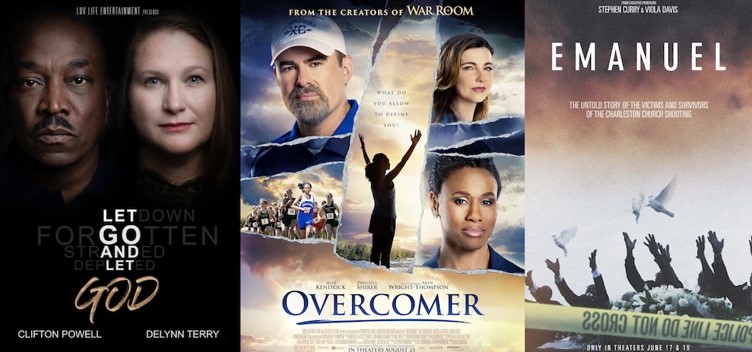In the dynamic world of streaming services, Netflix has always been a forerunner, pioneering a whole new approach to entertainment. With its vast and diverse catalogue of movies, series, and documentaries, the platform caters to an array of tastes and preferences. However, recent changes have sparked discussions and debates: Why is Netflix removing Christian movies from its collection?
Netflix’s Approach to Religious Content

As a global streaming behemoth, Netflix has always taken a broad approach when it comes to content selection. The aim is to provide a balanced offering, from Hollywood blockbusters to indie gems, international films, and diverse genres, including religious content.
In the past, Netflix hosted a range of Christian films. However, in recent times, subscribers have noticed a declining trend in the availability of this genre. The reasons behind this decision can be traced back to Netflix’s evolving content strategy.
Shift in Netflix’s Content Strategy

Netflix’s move to reduce the number of Christian movies is not an isolated occurrence. It’s part of a wider shift in content strategy, one that’s focused on creating and procuring original content over licensed movies and series. This transition is not limited to religious genres but is encompassing of all content types, from sci-fi to rom-coms.
Moreover, Netflix’s primary goal is to cater to the diversity of its global audience. With subscribers in over 190 countries, it’s a challenging task to accommodate every cultural, personal, and religious preference in the content lineup.
However, it’s important to stress that this doesn’t signify a complete disregard for Christian or religious content. Netflix is still home to a number of religiously-themed shows and films, albeit with a focus on narratives that appeal to a broader audience.
Netflix’s Decision-making Process
The removal of any film or series on Netflix isn’t arbitrary. It’s the result of a complex decision-making process, primarily based on viewing metrics. If a particular movie or series doesn’t garner enough views or engagement, it’s less likely to stay in the library. This metric-based approach applies to all content, regardless of the genre.
Impact of Netflix Removing Christian Movies

While some subscribers express disappointment over the reduction of Christian films, others appreciate Netflix’s broader content offering. Streaming platforms, after all, cater to a diverse set of subscribers, and it’s near impossible to please every viewer with every title.
For those missing their preferred Christian films, other platforms cater specifically to this genre. Services like Pure Flix and Crossflix offer a vast array of faith-based films, providing a more targeted solution for those in search of Christian content.
Alternatives to Christian Movies on Netflix
Even with the shift in strategy, Netflix continues to host Christian-themed content, albeit often presented in a different light. For instance, films and series exploring religious themes, historical contexts, or spiritual journeys are part of Netflix’s approach to integrating religious content within a more extensive framework.
Controversy over Why is Netflix Removing Christian Movies
The decision to remove Christian films has sparked conversations and even controversy. Some viewers interpret this as a move against religious content. However, Netflix maintains that its actions are based solely on business and viewership metrics.
It’s critical to understand that the shift in Netflix’s content strategy isn’t indicative of an anti-religious stance. Netflix continues to be committed to offering a diverse array of content, including narratives that touch upon faith and spirituality, albeit in ways that reach a wider, global audience.
Netflix’s Content Policies
Netflix’s policy on religious content is consistent with its overall commitment to diversity and inclusivity. The platform strives to provide a wide range of films and series that resonate with different cultures, faiths, and perspectives across the globe. The decrease in the number of Christian films is a consequence of broader content strategy changes rather than a specific stance on religious content.
Netflix’s Target Audience
As a global platform, Netflix’s target audience for religious content is as diverse as its subscriber base. While the exact Christian films may be changing, the overarching goal is to present narratives that explore faith, spirituality, and religious themes in ways that resonate with a global audience.
Netflix removing religious content? Perhaps it’s better to think of it as a reshuffling, a strategic shift toward content diversity that aligns with the ever-evolving preferences of its worldwide subscribers. So, keep exploring, keep streaming, and stay tuned to the exciting world of Netflix, where there’s always something for everyone.
Engaging with Christian Filmmakers and Audiences
As the decision to remove specific Christian films from Netflix continues to spark conversations, the dialogue often extends to the relationship between streaming platforms and Christian filmmakers. In fact, the reshuffling of Netflix’s content portfolio has inadvertently shed light on new opportunities within the Christian filmmaking industry.
Beyond Traditional Boundaries
The transformation in Netflix’s content strategy has pushed Christian filmmakers to evolve their approach. No longer confined to the traditional norms, they are now exploring narratives that could appeal to a wider, diverse audience. This is paving the way for the emergence of thought-provoking content that intertwines faith, culture, and entertainment in a captivating manner.
In fact, Christian filmmakers are realizing the potential of creating faith-based content that doesn’t merely speak to the Christian audience but also resonates with viewers who identify with different faiths or none at all. Movies like “The Shack” and series like “The Chosen” exemplify how Christian-themed content can be engaging, enlightening, and universally appealing.
The Rising Tide
As Netflix shifts gears, other players in the streaming industry are leveraging the gap left behind. Dedicated faith-based platforms like Pure Flix, Crossflix, and Dove Channel have emerged as promising alternatives. They offer an extensive range of Christian films, series, and even children’s programming, thereby catering exclusively to Christian audiences.
While these platforms may not have the extensive global reach of Netflix, they offer niche content specifically catered to their audience. This has led to their popularity among Christian viewers who desire faith-based entertainment.
Evolution of Faith-Based Content
The notion of faith-based content is also evolving. While traditional Christian movies were primarily biblically-based narratives or moral tales, modern faith-based content is not confined to these parameters. Netflix and other platforms now host content that explores faith through nuanced narratives and engaging storytelling.
For instance, a film might explore a protagonist’s spiritual journey in the backdrop of a crime thriller or a series could delve into socio-religious themes in a futuristic setting. The possibilities are endless and extend beyond the traditional scope of Christian or religious movies.
Constructive Dialogues
Netflix’s decision to remove certain Christian movies has opened the floor to constructive dialogues. Viewers, filmmakers, and platforms are engaging in discussions about content preference, representation, and diversity in entertainment.
Viewer participation has taken a front seat, with people voicing their opinions, preferences, and criticisms more openly. Platforms are listening, as evidenced by Netflix’s willingness to reconsider their content lineup based on viewer feedback and ratings.
Frequently Asked Questions
FAQ 1: Why is Netflix removing Christian movies?
Answer: Netflix periodically rotates its content library to make room for new movies and shows. This removal process applies to content across all genres, including Christian movies. It’s not specifically targeting Christian content, but rather part of its routine content management strategy.
FAQ 2: Is Netflix targeting Christian movies for removal due to their content?
Answer: No, Netflix’s content removal decisions are primarily based on viewer engagement, licensing agreements, and available space for new content. The removal of Christian movies is not a deliberate effort to target their content but rather part of their overall content rotation strategy.
FAQ 3: How can I find Christian movies on Netflix if they are being removed?
Answer: While some Christian movies may be removed from Netflix, others may be added. To find Christian movies on the platform, you can use the search bar and type keywords like “Christian,” “faith,” or specific titles or actors associated with Christian films. You can also explore the faith and spirituality category within Netflix’s genre options.
FAQ 4: Are there alternative streaming platforms that focus on Christian content?
Answer: Yes, there are streaming platforms like Pure Flix and Dove Channel that specialize in providing Christian and family-friendly content. These platforms cater specifically to audiences seeking faith-based movies, documentaries, and TV shows.
FAQ 5: Can I request that Netflix keeps certain Christian movies in its library?
Answer: Netflix generally bases its content decisions on viewer engagement and licensing agreements, so individual requests may not have a significant impact on content retention. However, you can provide feedback through Netflix’s customer support or social media channels, expressing your interest in specific Christian movies or genres to help shape their content offerings in the future.
Also Read: NourishVita Hair Growth Review (Updated)
Final Thoughts
As we delve deeper into the reasons Why is Netflix Removing Christian Movies? It becomes evident that it’s not merely about subtraction. It’s a recalibration aimed at aligning with global viewer preferences, investing in original content, and encouraging diversity in narratives.
Christian movies are not disappearing; they’re evolving and adapting to modern viewer expectations. Meanwhile, dedicated faith-based platforms are emerging to cater to the specific needs of Christian audiences.

A captivating wordsmith and dynamic blogger. With her pen as her wand, she weaves enchanting tales and thought-provoking insights that leave readers spellbound. Embrace the magic of her storytelling prowess and embark on an unforgettable literary journey with this talented writer.





![WWE Raw S31E49 [Lastest Update] 12 WWE Raw S31E49](https://beyondherd.com/wp-content/uploads/2024/05/WWw-Te.webp)